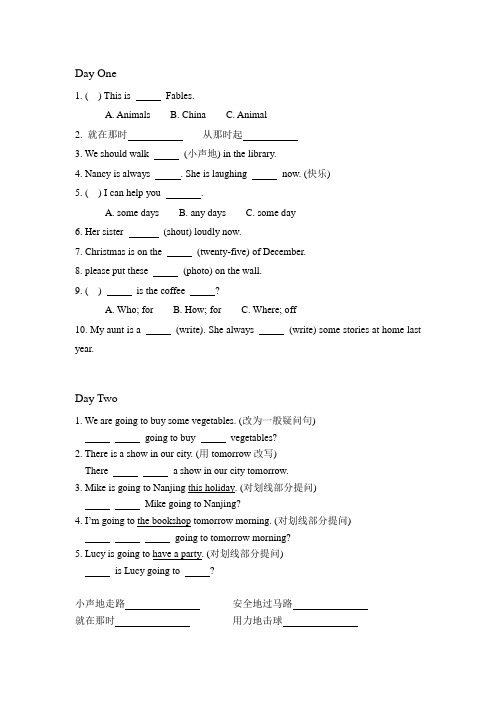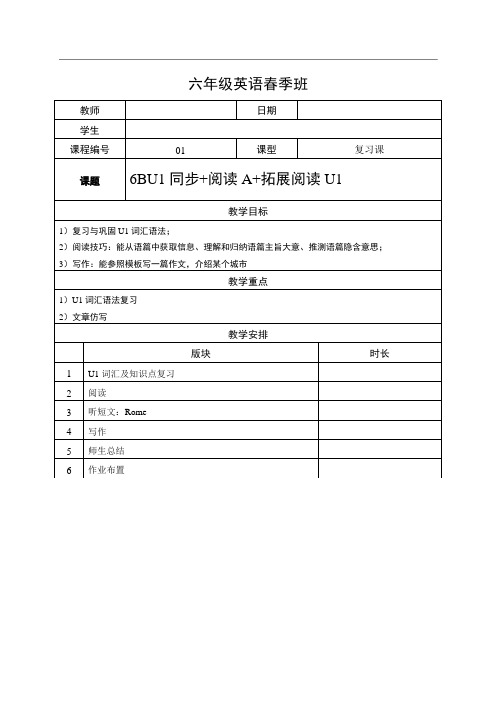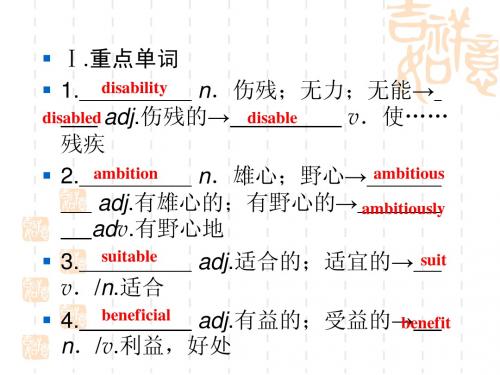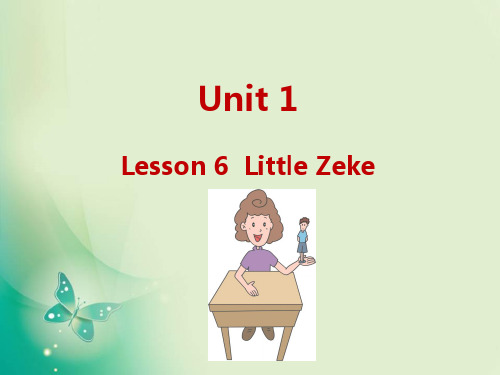Word study (U1-6)
六年级下册英语试题-U1-U4易错题整理(word,含答案) 译林版

Day One1. ( ) This is Fables.A. AnimalsB. ChinaC. Animal2. 就在那时从那时起3. We should walk (小声地) in the library.4. Nancy is always . She is laughing now. (快乐)5. ( ) I can help you .A. some daysB. any daysC. some day6. Her sister (shout) loudly now.7. Christmas is on the (twenty-five) of December.8. please put these (photo) on the wall.9. ( ) is the coffee ?A. Who; forB. How; forC. Where; off10. My aunt is a (write). She always (write) some stories at home last year.Day Two1. We are going to buy some vegetables. (改为一般疑问句)going to buy vegetables?2. There is a show in our city. (用tomorrow改写)There a show in our city tomorrow.3. Mike is going to Nanjing this holiday. (对划线部分提问)Mike going to Nanjing?4. I’m going to the bookshop tomorrow morning. (对划线部分提问)going to tomorrow morning?5. Lucy is going to have a party. (对划线部分提问)is Lucy going to ?小声地走路安全地过马路就在那时用力地击球Day Three1. My father is a (cook). He (cook) nice food yesterday.2. Road (safe) is very important.3. He asked me how (get) to the library.4. The song (sound) (good).5. My sister (like) (put) her things in order.6. I feel (sleep) now. I want (sleep).7. Mike can (run) (fast), but Nancy (run) (slow).8. (keep) safe, we should follow the traffic rules.9. Tom’s mother (be) angry, because Tom (not do) do his homework yesterday.10. Does your sister usually (get) up early?Day Four1. I see Nancy (clean) the room now.2. Road (safe) is very important. To keep (safe), we must cross the road (safe).3. Would you like (some) milk?4. Nancy (have) a toothache. She can’t eat (something) now.5. Lucy (be) a (science) three years ago. Now she (be) a (piano.)6. Mr. Xu (be) (angry) now. Because Tom (go) to bed late last night, and he (be) very (sleep) now.7. From then on, the little boy and girl (become) good friends.8. Liu Tao feels (happy) today because he does (good) at home.9. Look, there are some (tomato), (mango), (photo) and (potato).10. My birthday is on the (twenty-five) of January.Day Five1. Nancy never (go) to bed early. She (go) to bed late last night, and she (be) (sleep) now.2. Yang Ling is a (happy) girl. She always (feel) (happy).3. Mike (see) Tom (sing) in his bedroom now.4. We should eat (health), because food (safe) is very important.5. There (be) (一点) water in the bottle five minutes ago.答案:Day One1.C2.at that time from then on3.quietly4.happy happily5.C6.is shouting7.twenty-fifth8.photos9.A10.writer wroteDay Two1.Are you some2.will be3.When is4.Where are you5.What do6.walk quietly cross the road safely at that time hit the ball hard Day Three1.cook cooked2.safety3.to get4.sounds good5.likes putting6.sleepy to sleep7.run fast runs slowly8.To keep9.is, didn’t do10.getDay Four1.cleaning2.safety,safe,safely3.some4.has,anything5.was scientist is pianist6.is,angry,went7.became8.happy,well9.tomatoes,mangoes,photos10.t wenty-fifthDay Five1.goes,went,is sleeping2.happy,feels,happy3.is seeing,singing4.healthily,safety5.was, a little。
人教英语七下U1--6期末句型转换和英汉翻译完成句子练习及答案

人教英语七下U1--6期末句型转换和英汉翻译完成句子练习及答案一、句型转换部分(一)根据括号内的要求完成下列各题,每空一词(含缩略形式)。
1. She can make vegetable salad. (改为一般疑问句)________ ________ make vegetable salad?2. Lisa can read and write. (改为否定句)Lisa ________ read ________ write.3. My cousin does well in playing tennis. (改为同义句)My cousin ________ ________ ________ ________ tennis.4. David can play the violin. (对划线部分提问)________ ________ David ________?5. He can play soccer. (对划线部分提问)________ ________ ________ he play?【参考答案】1. Can she2. can’t; or3. is good at playing4. What can; do5. What sport can(二)根据括号内的要求完成下列各题,每空一词(含缩略形式)。
1. Jenny usually walks to work. (改为一般疑问句)________ Jenny usually ________ to work?2. Do Mark and Tony play soccer after school? (补全否定答语)No, ________ ________.3. They go to the library by bike. (对划线部分提问)________ ________ they go to the library?4. The village is about 8 kilometers from the bus station. (对划线部分提问) ________ ________ is the village from the bus station?5. John’s parents usually take the plane to Shanghai.(改为同义句)John’s parents usually go to Shanghai ________ ________.【参考答案】1. Does; walk2. they don’t3. How do4How far 5. by plane汉译英、英汉翻译部分(一)完成句子。
牛津版六年级英语下—U1同步—阅读A—听力—作文

六年级英语春季班1. 6B U1同步复习Presentation6B Unit1 Great cities in AsiaPart 1 V ocabulary(1)课文回顾Miss Guo and her students are at an exhibition /‚εκσ0'β0N3ν/about great cities in ___1___/'ε0N3/.-- Look at the map. Beijing is the capital of China. Do you know w___2___ city is the capital of Japan?-- ___3___ /'τ37κ037/is the capital of Japan.-- That’s right. W___4___ is it?-- It’s north-east of Shanghai.Kitty: ___5___ ___6___ is it from Shanghai to Beijing?Miss Guo: It’s about 1,400 kilometres.Alice: ___7___ can we travel to Beijing?Miss Guo: We can travel by train.Peter: ___8___ ___9___ does it take to travel from Shanghai to Beijing by train?Miss Guo: It ___10___ about ten hours.Beijing is the capital of China. It is north of Shanghai. You can find m___1___, ___2___/'π∃λ3σ/ and parks there.Many tourists like visiting those places. They always visit the Great Wall. There are more than 15 million people in Beijing. They enjoy eating dumplings.Tokyo is the capital of ___3___[dʒə'pæn]. It is ___4___ [nɔ:θ iːst] of Shanghai. You can see a lot of tall b___5___, huge department stores and f___6___ hotels there. Tourists usually go shopping in Tokyo. There are about 12 million people in this city. They love eating sushi.Bangkok is the capital of ___7___ ['taɪlænd]. It is ___8___ [sauθ west] of Shanghai. There are many temples and beaches in Bangkok. A lot of tourists e___9___ swimming in the sea at these beautiful beaches. There are about 8 million people in Bangkok. They love eating fruit. They also love eating spicy food.词组1. 泰国的首都_______________2. 日本的东北部_______________3. 乘飞机到曼谷 _______________4. 在过去_______________5. 参观长城_______________6. 从星期三到星期六_______________7. 超过_______________8. 在这些美丽的沙滩上_______________9. 一个半小时_______________ 10. 喜欢吃寿司_______________ 11.一张中国地图_______________ 12. 去不同的城市旅游_______________ 13. 在一次展览会上_______________ 14 .两天半_______________ 15. 在过去_______________ 16. 著名的旅馆_______________ 17. 喜欢吃饺子_______________ 18. 许多高楼_______________ 19. 其他的地方_______________ 20.两百万游客_______________(2)6B U1词性转换整理研读教材,整理词汇在以下表格中序号单词词性释义1tour n. 旅行tourist n. 游客2build v. 建造building n. 建筑3 Asia n. 亚洲Asianadj. 亚洲的n. 亚洲人4Japan n. 日本Japanesen. 日本人adj. 日本人的(3) 6B U1知识点整理1.north/south/east/west of…north-east/north-west/south-east/south-west of …2.from…to3.How long does it take …?4.by plane/ship/train5.like visitinglove eatingenjoy swimmingⅠ. Choose the best answer (选择最恰当的答案)( ) 1. There are more than 18 ______ people in Shanghai now. (★)A. millionsB. thousandC. hundredD. millionPractice( ) 2.Mr. Black ______ to Hong Kong twice. (★)A. have beenB. has beenC. goD. went( ) 3. London is the capital ______ England. (★)A. forB. inC. ofD. from( ) 4. My mother ______ home at 6:00 every evening. (★)A. getB. gets toC. get toD. gets( ) 5. Lily enjoys ______ in his daily life. (★)A. to collect stampsB. collect stampsC. collected stampsD. collecting stamps( ) 6.It ______ him half an hour ______ to Ocean Park yesterday. (★)A. takes…to getB. took…to getC. takes…gettingD. took…getting( ) 7. -- How can we travel to Xian?--______. (★)A. By trainB. Take the trainC. By a train.D. Take train.( ) 8. --______ is it from Shanghai to Shihua?--About 80 kilometres. (★)A. How longB. What timeC. How farD. How away( ) 9. -- Where’s Guangzhou?--It’s ______ China. (★)A. north ofB. east ofC. south ofD. north of( ) 10. In the past, people ______ other places by ship. (★)A. travel toB. travel inC. are traveling toD. travelled to( ) 11. --______ city is the biggest city in China? (★)--I think it’s Shanghai.A. WhichB. WhatC. WhereD. How( ) 12. We went to Qindao by ferry last summer. The underlined part means “______”. (★)A. by shipB. by bikeC. by trainD. by air( ) 13. There are ______ strawberries in the fridge. Would you like to buy ______? (★)A. few…someB. a few…some C .few…any D. a little…some ( ) 14. Russia is ______ China. (★★)A. in the north ofB. the north ofC. on the north ofD. to the north of ( ) 15. --How long does it take you to travel from Jinshan to Shanghai by bus?--______. (★)A. An hour and a halfB. One and a half hourC. Two and a half hourD. Two hour and a halfII. Completer the sentences with the given words in their proper forms (用括号中所给单词的适当形式完成下列句子)1. What about going to other __________ with us? (place)2. Hangzhou is one of the most famous __________ in China. (city)3. The Greens like __________ on Nanjing Road Walk Way. (shop)4. Can you find a lot of tall __________ in Pudong New Area? (build)5. __________ usually visit Yu Garden. (tour)6. People from different __________ like different kinds of food. (country)7. Most people enjoy __________ to warm places in winter. (travel)8. Shanghai __________ Centre is near the People’s Square. (exhibit)Ⅵ. Rewrite the following sentences as required (根据所给要求,改写下列句子。
word study in U1M7

5. adapt vt.使适应;改编→ adaptation n.适应;改编 absent 6. absence n.缺席;不在某处→ adj.缺席的;不在的→ present adj.出 席的;到场的 7. annoy v.使……不悦;惹恼→ annoyed adj.颇为生气的→ annoying adj.令人生 气的→ annoyance n.烦恼 8. firm n.公司→ firm adj.结实的; firmly 坚固的;坚定的→ adv.坚定地;结 实地
13. graduation n.毕业;毕业典礼→ graduate graduated vi.毕业→ adj.受教育的 14. access n.(接近的)方法;通路;可接 近→ accessible adj.可接近的;可进入的; 可使用的 15. approval n.赞成;认可→ approve v.赞成;认可 16. n.收益;利润;盈利→ profitable profit adj.有利的;可赚钱的
9.
encourage n.鼓励;奖励→ vt.鼓励→ encouraging adj.鼓舞人心的 10.conductn.行为;品行&vt.指挥;管理; conductor 主持→ n.指挥家;售票员; 引导者 11. politics n.政治(学)→ political adj.政治的; politician 政治学的→ n.政治家 12. assistance n.协助;援助→ assistant n.助手;助理→ assist v.帮助;援助 encouragement
Ⅰ.重点单词 1. disability n.伤残;无力;无能→ disabled adj.伤残的→ disable v.使…… 残疾 2. ambition n.雄心;野心→ ambitious adj.有雄心的;有野心的→ ambitiously adv.有野心地 3. suitable adj.适合的;适宜的→ suit v./n.适合 4. beneficial adj.有益的;受益的→ benefit n./v.利益,好处
四年级下册英语课件-U1-Lesson 6 Little Zeke(1)_冀教版 (共11张PPT)

•
14、意志坚强的人能把世界放在手中 像泥块 一样任 意揉捏 。2021 年8月2 日星期 一2021/ 8/2202 1/8/220 21/8/2
•
15、最具挑战性的挑战莫过于提升自 我。。2 021年8 月2021 /8/220 21/8/22 021/8/ 28/2/20 21
•
16、业余生活要有意义,不要越轨。2 021/8/ 22021/ 8/2Aug ust 2, 2021
In Emma's desk.
6. What does Little Zeke do?
7. Who comes to Emma’s class?
8. Does Little Zeke help her?
Learning from the story
1. Do you like Little Zeke? 2. Why or why not? 3. What do you learn from the story?
•
17、一个人即使已登上顶峰,也仍要 自强不 息。202 1/8/22 021/8/2 2021/8 /22021 /8/2
谢谢观赏
You made my day!
我们,还在路上……
2. Who is Emma? She is Little Zeke's friend.
3. How many friends does Emma have?
4. How many friends does Little Zeke have at first?
5. Where is Little Zeke?
11、越是没有本领的就越加自命不凡 。2021/ 8/2202 1/8/220 21/8/2 Aug-21 2-Aug-2 1
外研版九年级上册教材分析

4. 语音
1) Rhythms in sentences 2) Stresses in sentences 3) Links of sounds in sentences 4) Intonation of a speech
Page
8
5. 学习策略 (Learning to learn)
1) How to use adjectives to express facts and opinions 2) How to search for the theme of a passage 3) How to make notes 4) How to scan for target information 5) How to avoid repetition while writing 6) How to form a new word with suffixes and prefixes 7) How to accumulate vocabulary 8) How to express measurements in English (imperial and metric) 9) How to understand a difficult sentence 10) How to read a table or a chart Page 9 11) How to understand a speaker’s persuasion
III. 教学策略
语言知识
1. 词汇教学 2. 语法教学 3. 语音教学
语言能力
1. 听说教学 2. 阅读教学 3. 写作教学
Page 15
语言知识的教学策略
1. 词汇教学
北京市人教版英语单词表-六年级上册
6上U4
96 工厂 97 工人 98 邮递员 99 商人;企业家 100 警察 101 渔民 102 科学家 103 飞行员 104 教练 105 国家 106 校长 107 大海 108 保持 109 大学 110 体育馆 111 如果 112 记者 113 使用 114 打字 115 迅速地 116 秘书 117 生气的 118 害怕 119 难过的 120 担心的;发愁的 121 高兴的 122 看病 123 穿 124 更多的 125 深的 126 呼吸 127 深深吸一口气 128 数数 129 数到十 130 追赶 131 老鼠(mouse的复数) 132 邪恶的;坏的 133 (使)受伤 134 有病;不舒服 135 有毛病 136 应该 137 觉得;感到 138 健康;身体好 139 坐 140 草坪 141 听见 142 蚂蚁 143 担心;担忧
/'sʌbwei/ 6上U2
33 火车
train
/trein/
6上U2
34 慢的
slow
/sləu/
6上U2
35 减少;降低
down
/daun/
6上U2
36 慢下来
slow down
6上U2
37 停下来
stop
/stɔp/
6上U2
38 夫人
Mrs.
/'misiz/
6上U2
39 早到的
early
/ə:li/
/'wʌrid/
6上U6
/'hæ pi/
6上U6
6上U6
/weə/
6上U6
/mɔ:/
6上U6
/di:p/
6上U6
/breθ/
七下基础复习U1-6单词
hallway
铺床
make one's bed
大厅;礼堂
hall
脏的
dirty
餐厅
dining hall
厨房
kitchen
倾听;听
listen
更多
more
听……
listen to
吵闹的
noisy
打架
fight
放松;休息
relax
抱歉的;难过的
sorry
读
read
在外面
outside
非常讨厌的
terrible
幸运;运气
luck
练习
practice
保持;保留
keep
学习;学会
learn
头发
hair
熊猫
panda
猫
cat
动物园
zoo
睡觉
sleep
老虎
tiger
友好的
friendly
大象
elephant
腼腆的
shy
树袋熊;考拉
koala
救助
save
狮子
lion
象征
symbol
长颈鹿
giraffe
旗帜
flag
动物
从不
never
跑
run
早的
early
打扫
clean
品尝
taste
散步;步行
walk
五十
fifty
去散步
take a walk
工作;职业
job
很快地
quickly
工作
work
或者;(否)也
either
部编版人教版新教材英语四年级下U1L1-6练习试卷
部编版⼈教版新教材英语四年级下U1L1-6练习试卷四下Unit One 练习Lesson 1 课后练习⼀、听⼒:将听到单词的序号填⼊提前的括号⾥。
()1.A welcome B from C there()2.A home B room C homeland()3.A bedroom B computer C gift()4.A here B there C where()5.A write B read C speak⼆、笔试:写出下列单词1.球____________2.⽓球_________3.电视_________4.沙发___________5.客厅_________6.扶⼿椅________三、连词组句1.to, my, welcome, home(.)________________________________2.is, there, new, a, bed(.)_______________________________3.an, bed, is, there, old, bedroom, in, the______________________四、句型转换例:There is a new computer.(肯定句) Is there a new computer?(⼀般疑问句)1.There is a new desk.(变为⼀般疑问句)__________________________2.Is there a nice gift?(变为肯定句)____________________________五、判断发⾳是否相同。
(⽤T,F表⽰)1.Welcome home ( )2.chair there ( )2.desk bed ( ) 4.there here ( )Lesson 2 课后练习⼀、听⼒:根据问句选答语() 1. A It’s a new computer. B There is a new computer.() 2. A It’s a sofa. B There is a sofa.() 3. A It’s five o’clock. B I’m five.() 4. A There are three kites. B. They’re kites.⼆、笔试:补全句⼦1.There is an _______in the bedroom.(扶⼿椅)2.There are two _______in the living room.(沙发)3.There are three _______over there.(⽓球)4.There is a new________on the chair.(球)三、写出下列单词的复数1.kite_____2. sofa_______3. armchair________4. ball________5.tomato______6. potato______7.watch________8.clock_______四、变句型1.There are three kites.(变为⼀般疑问句)__________________________2.Is there a new bed?(变为肯定句)______________________________3.There is a clock in the living room.(变为否定句)_____________________五、⽤is 和are填空1.There______some milk.2.There______five balloons.3.There ______a little dog and two cats.4.There ______some bread and cakes.5.There ______some apples and juice.Lesson 3课后练习⼀、听⼒:选择你听到的单词()1. A kitchen B bedroom C living room()2. A look B see C love()3. A table B desk C chair()4. A cake B sandwich C hamburger⼆、笔试:变句型1.There is some coffee.(否定句)__________________________2.There are two cakes.(⼀般疑问句)_______________________3.Is there a kite on the wall?(肯定句)________________________4.There is a bed.(变复数)___________________________三、就划线部分提问例:There is a new sofa in the room.(就划线部分提问)What’s in the room?1.There are two computers in the study.____________________________________2.There is a big clock and two pictures on the wall.___________________________3.There is some rice in the bowl.___________________________4.There are two books on the desk.____________________________Lesson 4课后练习⼀、听⼒:选择你听到的单词()1. A housework B homework C workbook()2. A make B work C wash()3. A clean B mop C do()4. A table B chair C brush⼆、笔试:补全句⼦1.I’ll wash the _______.(杯⼦)2.Please hang the _______on the wall.(图⽚)3.There is a new ________on the wall.(钟表)4.Can I have a _________?(蛋糕)三、变换句型例:I can make the bed.(肯定句)I can’t make the bed.(否定句)1.I can clean the table. (变为否定句)___________________________2.I can mop the floor. (变为否定句)__________________________例:I can make the bed.(肯定句)Can you make the bed?(⼀般疑问句)3.I can clean the table.(变为⼀般疑问句)___________________________4.I can mop the floor.(变为⼀般疑问句)____________________________四、判断发⾳是否相同(⽤T,F 表⽰)1.can make ( )2. bed then ( )3.good floor ( )4. with kitchen ( )5.wash table ( )6. mop clock ( )⼀、词汇:A. 将图⽚与对应词汇连线1.bedroom living room study kitchen bathroom B.选出与例词属于同⼀类的单词( ) 1.study A. bedroom B. table C. ball( ) 2.clock A. bathroom B. picture C. kitchen( ) /doc/b437e14cb6daa58da0116c175f0e7cd184251826.html A. kite B. picture C. DVD player ( ) 4.your A. he B. my C. they⼆、根据汉语情景描述选答案( ) 1. Peter说“我在卧室睡觉”,应该说:_____A. I sleep in the bedroom.B. I study in the bedroom.( ) 2. 同学问你“What's in your classroom?”你应回答:_____A. They are some desks and chairs.B. There is a teacher and some students. ( ) 3. 你想问客厅⾥有什么,应该说:_____A. What is in the living room?B. Who is in the living room?( )4. 你想说“我在客厅看电视”,应该说:_____A. There is a TV in the living room.B. I watch TV in the living room.三、按要求改写句⼦I have an armchair in my bedroom.(同义句)_______ ___________ an armchair in my bedroom.⼀、单项选择( ) 1. There is _____ sofa and _____ armchair.A. a; aB. a; anC. an; a( ) 2. There are three _____ and four _____.A. kites; balloonsB. computer; sofasC. desks; chair ( ) 3. Look _____ the bedroom.A. /B. atC. on( ) 4. Welcome to _____ home.A. meB. myC. I( ) 5. I _____ in the study.A. go to sleepB. watch TVC. read books⼆、读⼀读,图⽂匹配_______________ _________________ _______________ _______________ ________________A. Look! This is my new home.B. There's a big fridge and four chairs in the kitchen.C. Oh! There is a lion in my bedroom.D. There are six chairs and a sofa in the living room.E. This is NOT my home.参考答案Lesson1⼀、1.from 2.room 3.gift 4.where 5.write B B C C A ⼆.1.ball 2.balloon/doc/b437e14cb6daa58da0116c175f0e7cd184251826.html 4.sofa 5.living room 6.armchair 三.1.Welcome to my home. 2.There is a new bed.3.There is an old bed in the bedroom.四.1.Is there a new desk? 2.There is a nice gift.五.1. F 2. T 3. T 4. FLesson2⼀、1.What’s on the desk? 2. What’s this in English?3. What’s the time?4.What’s on the wall?答案:B A A A⼆、1. armchair 2.sofas 3.balloons 4.ball三、 1.kites 2. sofas 3. armchairs 4. balls5.tomatoes6.potatoes7.watches8.clocks四、1.Are there three kites? 2. There is a new bed.3.There is not a clock in the living room.五、1. is 2. are 3. is 4. is 5. areLesson3⼀、1.kitchen 2. love 3. table 4. hamburger A C A C⼆、1.There isn’t any coffee. 2.Are there two cakes?3.There is a kite on the wall.4. There are some beds.三、1. What’s in the study? 2. What’s on the wall?3.What’s in the bowl?4.What’s on the desk?Lesson4⼀、1.housework 2. wash 3.clean 4.brush A C A C⼆、1.cup 2. picture 3. clock 4. cake三、1. I can’t clean the table. 2. I can’t mop the floor.3.Can you clean the table?4. Can you mop the floor?四、1. F 2. T 3.F 4.T 5.F 6.TLesson5⼀、词汇:A. 将图⽚与对应词汇连线1.bedroom living room study kitchen bathroom B.选出与例词属于同⼀类的单词( A ) 1.study A. bedroom B. table C. ball( B ) 2.clock A. bathroom B. picture C. kitchen( C ) /doc/b437e14cb6daa58da0116c175f0e7cd184251826.html A. kite B. picture C. DVD player ( B ) 4.your A. he B. my C. they⼆、根据汉语情景描述选答案( A ) 1. Peter说“我在卧室睡觉”,应该说:_____A. I sleep in the bedroom.B. I study in the bedroom.( B ) 2. 同学问你“What's in your classroom?”你应回答:_____A. They are some desks and chairs.B. There is a teacher and some students. ( A ) 3. 你想问客厅⾥有什么,应该说:_____A. What is in the living room?B. Who is in the living room?( B )4. 你想说“我在客厅看电视”,应该说:_____A. There is a TV in the living room.B. I watch TV in the living room.三、按要求改写句⼦I have an armchair in my bedroom.(同义句)__There__ ___is____ an armchair in my bedroom.Lesson 6⼀、单项选择( B ) 1. There is _____ sofa and _____ armchair.A. a; aB. a; anC. an; a( A ) 2. There are three _____ and four _____.A. kites; balloonsB. computer; sofasC. desks; chair ( B ) 3. Look _____ the bedroom.A. /B. atC. on( B ) 4. Welcome to _____ home.A. meB. myC. I( C ) 5. I _____ in the study.A. go to sleepB. watch TVC. read books⼆、读⼀读,图⽂匹配_______E________ _______C__________ _______A________ ______D_________ ______B__________A. Look! This is my new home.B. There's a big fridge and four chairs in the kitchen.C. Oh! There is a lion in my bedroom.D. There are six chairs and a sofa in the living room.E. This is NOT my home.。
小学-英语-外研版(三起)-六上M6U1
dif法
often adv. 经常,常常 用法:频度副词,通常放在句中系动词之后,行为动词之前。
He often plays football after school. (放学后他经常踢足球。)
Watch and read
Listen and fill in the blanks.
Dear Sam and Amy, I am Daming’s friend and I want to be your friend too. I live in New York, but I am not American. I am from London _i_n_t_h_e__U. SKo we are all British! Do you like China? I want to _v_is_i_t_C__h_in_a__n_e_x_t__y_e.aDraming has got _a__C_h_i_n_e_s_e_d__ra_g__o_n_k_i_t_e_ and we often fly it in the park. It’s _d_if_f_i_c_u_l_t_f_o_r__m_e. Have you got a book about the US? I can _s_e_n_d__y_o_u__o.nPelease write to me and we can be pen friends. Daming says he will write to you soon. Best, Laura
Laura lives in New York and she wants to be Sam’s pen friend.
pen friend = pen pal
live in 居住在
- 1、下载文档前请自行甄别文档内容的完整性,平台不提供额外的编辑、内容补充、找答案等附加服务。
- 2、"仅部分预览"的文档,不可在线预览部分如存在完整性等问题,可反馈申请退款(可完整预览的文档不适用该条件!)。
- 3、如文档侵犯您的权益,请联系客服反馈,我们会尽快为您处理(人工客服工作时间:9:00-18:30)。
Unit 1raw: adj. 阴冷的; 生的, 未经加工的The event took place on a raw February morning.Raw materials are the natural substances from which industrial products are made.launch: vt. 1) start这家电脑公司今年开始生产一种新产品。
This computer company launches a new product this year.2) 发射,发动launched the world’s first artificial satellitelaunch an attack 发动进攻launch a company 开一家公司launch threats at sb. 向某人发出威胁campaign: n. 运动,战役The government is launching a massive campaign against corruption.(发动一场大规模的运动)在我们城市开展的灭鼠运动开端良好。
The campaign against rats in our city got off to a good start.conquest: n. conquering, defeat1939年德国征服了波兰。
The year 1939 had witnessed the conquest of Poland by Germany.retreat: v. withdraw 撤退我们采取如下策略:敌进我退,敌退我追。
We adopted the following strategies: When the enemy advances, we retreat; when they retreat, we pursue.retreat from 从…撤退retreat to 撤退到retreat advance:advance against (on, to, toward) 朝…前进engage: vt. 1)交战他们与敌人交战。
They engaged the enemy.2) involve 使参加We tried to engage him in our conversation, but in vain.3)吸引(注意力)Nothing engages his attention for long.4) occupy 占用Work engages much of her time.engage (sb.) in sth.: (使)从事某事be engaged in politics/business 从政/做生意crucial: adj. 至关重要的(后接to)增强消费者信心是经济复苏的关键。
Improved consumer confidence is crucial to economic recovery.take a gamble: take a risk 冒险The company took a gamble by cutting the price of their products, and it paid off.press on/ahead: 继续句型: press on/ahead (with sth.)Our school authorities are keen to press on with educational reform.bide one’s time: 等待时机His political rivals are biding their time for an attack on his policies.minus: prep.零下, 减Tomorrow’s temperature will be as low as minus ten degrees centigrade.我在期末考试中得了B减。
minus 的反义词是plus(加上): 3 plus 6 is 9.2) minus 形容词,“负的;减去的”:a minus quantity 负数;minus electricity 负电minus 名词,“负号,减号;负数”drag on: 缓慢费力地走,拖延这个会还要拖多久?How much longer is the meeting going to drag on?at the cost of: with the loss of 以…为代价The local government developed its economy but at the cost of environment.at no costat all costs 不惜一切代价limp vi. 一瘸一拐地走I injured my ankle and had to limp.adj. 软弱的,无精神的a limp handshake 无力的握手limp opposition 微弱的反抗catch sb. off guard: 趁不备The invitation to his wedding caught me off guard.instruct: vt. 1) give directions to (sb.)The professor instructed us that we had one month to conduct the project.instruct sb. to do sth.instruct sb. thatinstruct sb. with quote2) teach (sb.) instruct sb. in/on sth.他们教给了我做这项工作的最好办法。
They instructed me in the best ways of doing the job.render: vt. (same as make) 使成为地震导致成百上千的人无家可归。
Hundreds of people were rendered homeless by the earthquake.render into 译成(某种语言)render blow for blow 以牙还牙render good for evil 以德报怨bring… to a halt: stop completely我们的旅行因风暴而终止。
Our journey was brought to a halt by a storm.offensive: n. attack 进攻The Red Army led a massive military offensive.launch/mount an offensive 发动进攻carry out/undertake an offensive 进攻on the offensive 处于攻势assume/go on/go over/take the offensive进攻,采取攻势adj.进攻的;这支进攻的军队很快地赢得了阵地。
The offensive troops gained ground quickly.offend (v.) 冒犯,攻击reckon: v. 计算,认为,加以考虑The existence of the U.S. is reckoned from the Declaration of Independence.句型: be reckoned with=be taken into consideration 被加以考虑All these problems had to be reckoned with as they arose. toll: n. 伤亡人数1) The death toll rose from 270 in 1952to 5,000 in1954.war toll 战争伤亡人数take a heavy toll 造成重大伤亡(危害或损失)(路桥) 通行费2) Each car must pay a toll to cross the bridge.charge/exact/impose a toll征收(道路、桥梁等的)通行费toll-gate 收费亭levy toll on sb. 向某人收费(或征税)v. 敲(钟)Bells were tolled all over the country at the President’s death. Unit 2eliminate (L.19): : vt. remove; get rid of 排除,取消The police have eliminated all the other suspects.句型: eliminate sth. from sth.她已被取消了参加游泳比赛的资格。
She has been eliminated from the swimming race. elimination (n.)in the air (L.21): : 在空中,悬而未决Hundreds of birds suddenly rose in the air.我们的计划尚未确定。
Our plans are still in the air.start up (L.21) : 发动,启动,开始Put the key in the ignition and turn it to start the car up.alert (L.22) : vt. warn sb. 使警觉,使注意句型: alert sb. to sth.警察警告我有危险。
The policeman alerted me to the danger.adj. attentive; watchful 警觉的,警惕的句型: be alert to dangerThe squirrels are quite alert to dangers.n. watchfulness句型: on the alert 警惕The hunters are on the alert for wolves.prototype (L.29): n. 原型,样品prototype equipment /machine /modelproto- 前缀,表示“最初的,原始的”,protocluster 原星团(cluster 丛)protogalaxy 原星系( galaxy 星系, 银河)protovirus 原始病毒(virus 病毒)monotonous (L.31): adj. 单调的,一成不变的His voice was so monotonous that it sent me to sleep.The explorers lived on monotonous diet of rice and vegetables. hazard (L.31) : n. a danger or risk 危险,危害hazard to / for sth.Polluted water sources are a hazard to wildlife.The lead in the exhaust gas is a real health hazard.at all hazards 不顾一切风险; 在任何情况下in hazard 在危险中, 受到威胁be on the hazard 在危险中vibrate (L.46) : v. shake颤动,震动当司机发动了发动机时,公共汽车颤动着。
